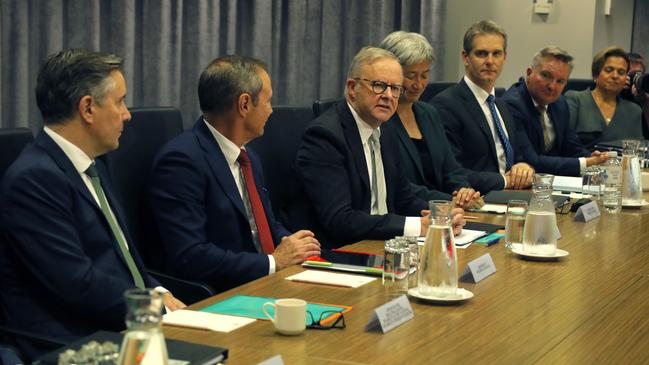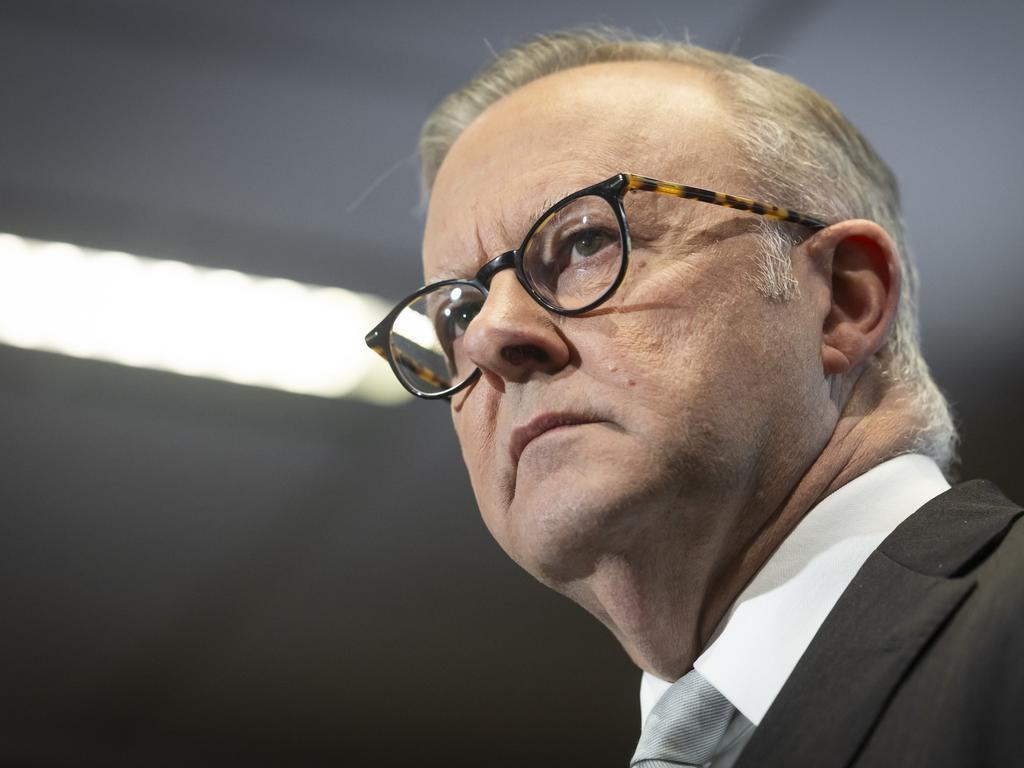Anthony Albanese leaves door ajar to super tax compromise with Coalition
Anthony Albanese has left open the chance of rewriting his proposed superannuation tax reforms to strike a deal with the Coalition that would sideline the Greens.

Anthony Albanese has opened the door to rewriting his proposed superannuation tax hikes to strike a deal with the Coalition that would sideline the Greens, as business calls for a new era of bipartisanship to enact generational reforms that address the nation’s growing economic challenges.
The Prime Minister welcomed signs the Coalition was willing to negotiate on legislation, with a renewed appetite for consensus to be tested on budget repair, productivity-enhancing reforms, environmental law reforms, a 2035 emissions reduction target, cuts to student debt and Australia’s response to geostrategic and trade challenges in the era of Donald Trump.
After opposition Treasury spokesman Ted O’Brien told The Australian on Sunday he would be willing to consider a deal on superannuation reform if Labor axed the model to tax unrealised capital gains, Mr Albanese said on Tuesday the government could not pass legislation through parliament on its own.
When asked if he would consider tweaking the superannuation proposal to win the support of the Coalition, Mr Albanese said: “We do not have a majority in the Senate; we obviously work with different parties.”
With Labor needing the support of either the Coalition or the Greens to pass legislation through the Senate, Mr Albanese urged the opposition to back his election promise to cut student debt by 20 per cent when parliament resumed in July. “If the signal from the Coalition is across the board – I’m not talking specifically (about superannuation) here – that they will be more constructive and not just be part of a no-alition with the Greens party, then that would be welcome,” Mr Albanese said. “I think people in the last term of parliament saw a Coalition that was just committed to blocking everything: housing investment, support for further investment in education.”
Australian Chamber of Commerce and Industry chief executive Andrew McKellar said business would welcome a constructive approach between the major parties, rather than giving the Greens final say on legislation.
“From a business point of view, wherever possible, we want to see constructive engagement between the major parties to get policy outcomes that are in the national interest,” Mr McKellar said. “We would prioritise anything that is around issues that go to productivity, competitiveness, energy solutions.
“If there’s a bunch of issues that are left to be resolved at the mercy of the Greens, then I think business would have very significant concerns that is not going to lead to outcomes which are in the interest of the nation or of our economic performance.”
Jim Chalmers’ plans to double the tax on superannuation earnings for balances above $3m to 30 per cent without indexation also includes a new tax on unrealised capital gains, which business figures and senior economists have condemned.
The Australian has spoken to senior Labor MPs who are opposed to the model of taxing unrealised capital gains.
Mr O’Brien has made clear a new model would be needed for the Coalition to be open to any proposal to raise more revenue through superannuation, with the “red line” being taxing unrealised capital gains and a lack of indexation.
A deal between Labor and the Greens would see the unrealised capital gains model be retained and potentially impact more people than the Treasurer intended.
Mr O’Brien will tell an event hosted by the Property Council of Australia on Wednesday that Labor’s proposal would make housing even less affordable, as investors moved their money out of superannuation into property to avoid the tax. “In principle, regardless of what policies come forward, as an opposition we will be constructive where we can and critical where we must,” he will say, according to draft comments provided to The Australian.
“If Mr Albanese is fair dinkum about speaking with the Coalition on his super tax he needs to know that we find this entire proposal repugnant. The Coalition believes in lower simpler and fairer taxes. It just so happens that Labor’s super tax is super big and super bad.”
Mr Albanese’s comments build pressure on Dr Chalmers, who has faced an onslaught of criticism over his tax grab, which could dampen the amount of money superannuants invest in start-ups, green and renewable companies, mining and critical minerals explorers, farmers and property investors.
Senior Liberal MPs said they were shocked to find Mr O’Brien had spoken in favour of negotiating with Labor on higher superannuation taxes in exchange for dumping the unrealised gains tax proposal, with any deal likely to cause serious division within the Coalition. But there are members of shadow cabinet and Liberal luminaries who favour striking a deal with the government.
The Coalition has a shadow cabinet meeting this Thursday, with one Liberal MP saying it could be “messy”, amid a push for the focus of the meeting to be on the “principle” of being against higher taxes.
Former Treasury spokesman Angus Taylor – whose supporters are likely to lead the charge against a deal with Labor – went to the last election opposing any new taxes on superannuation. But his plan also included higher income taxes than Labor, bigger deficits for two years, a failure to forecast a surplus and very little economic reform.
On Labor’s current model, tax experts are concerned superannuants have already started shifting assets out of their accounts, putting in doubt that the $40bn in revenue the federal government is expected to receive from the tax over the next decade.
The Parliamentary Budget Office, which costed the Coalition’s policy to scrap Labor’s unrealised capital gains tax plan, says taxpayers would be hit with a $5.5bn bill over the forward estimates, including more than $2.4bn by the fourth year, and almost $7bn a year within 10 years.
An tax office spokesman said the department was concerned about changes in behaviour of superannuants as more people become aware of the impact. “While the legislation is yet to pass parliament, we have seen some early suggestions that private groups may seek to alter their arrangements to limit their exposure to the proposed Division 296 tax in case the legislation is passed at a later date,” the spokesman said.
“Our focus is on understanding emerging issues and ensuring we are well-positioned to respond to any risks that may arise and ensure that private groups are made aware of any potential tax consequences for entities within their group as a result of any changes to their arrangements.”
Thousands of people have signed a petition launched by Wilson Asset Management chairman Geoff Wilson to stop the unrealised gains component of the proposal.




To join the conversation, please log in. Don't have an account? Register
Join the conversation, you are commenting as Logout